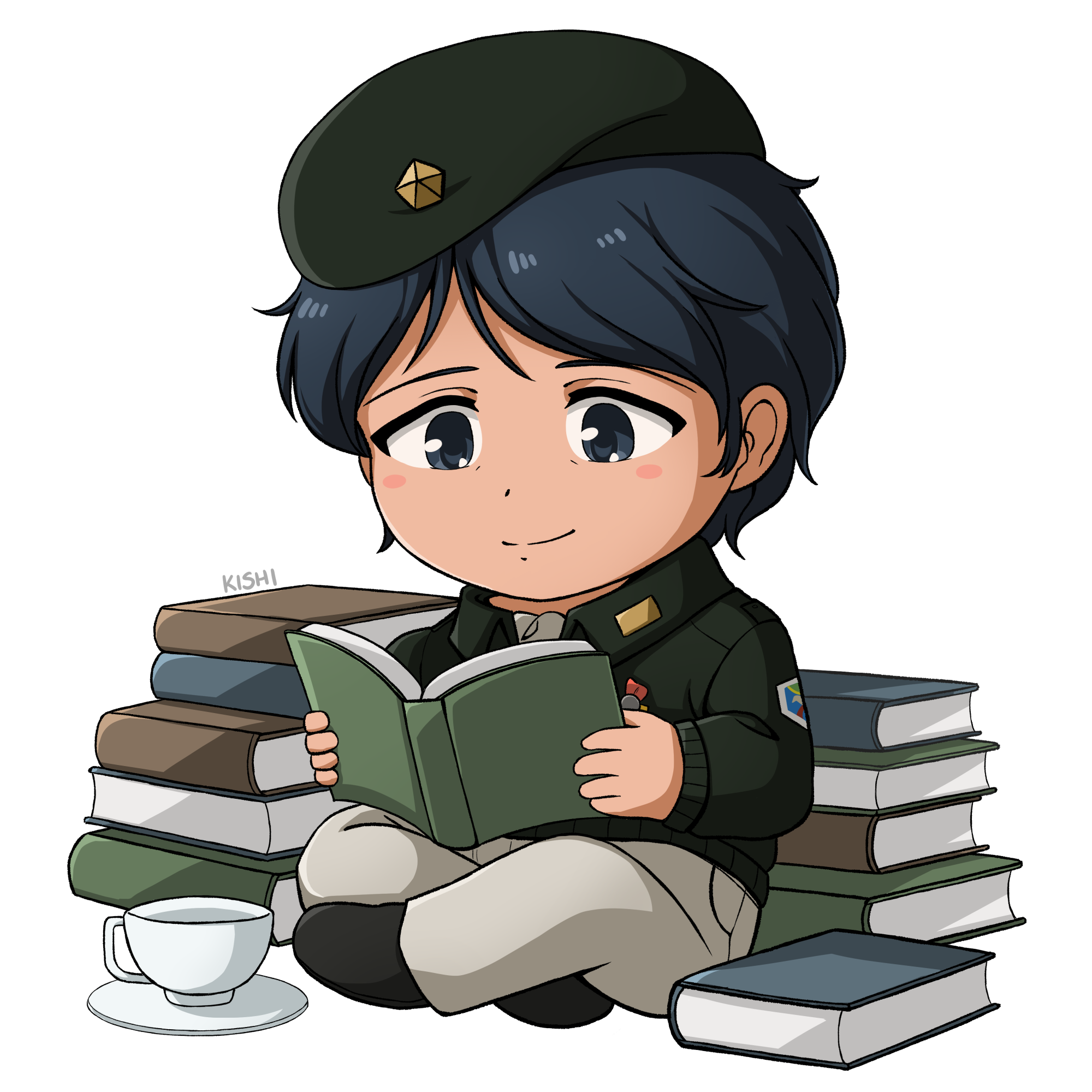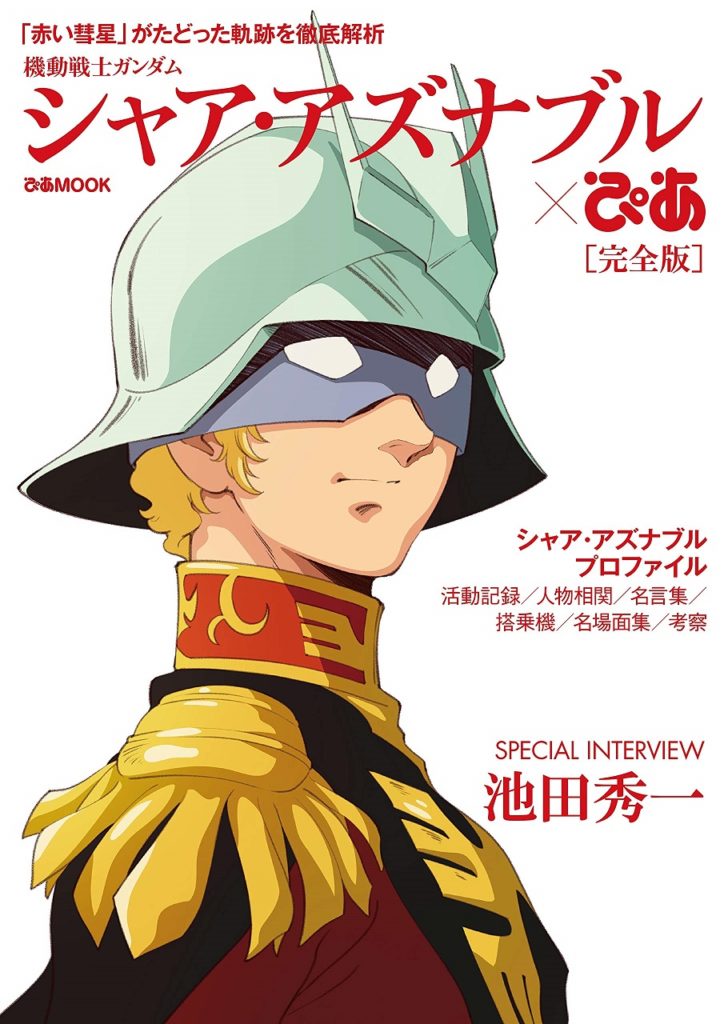
[originally posted 4 July 2023]
The following is a translation of the interview with Shūichi Ikeda from the Char Aznable Pia Mook, published by Pia (ぴあ) in 2020.
The existence of Gundam has moved from a “point” to a “line”
Please tell us how you feel now that Mobile Suit Gundam has reached its 40th anniversary.
It really goes by fast, doesn’t it? It hardly feels like 40 years have already passed.
Especially the last 10 years or so have been really fulfilling and seem to have passed in a blink of an eye. Starting with the first Mobile Suit Gundam (hereafter, Gundam), the movie version trilogy, Mobile Suit Z Gundam (hereafter, Zeta), Mobile Suit Gundam Char’s Counterattack (hereafter, Char’s Counterattack), and the theatrical version of Zeta (hereinafter referred to as Zeta: A New Translation), and all the works in which I played Char, each existed as a “point”.
After the TV series of Gundam ended, there was a film trilogy about two years later, followed by the TV series of Zeta a few years after, and so on. After Char’s Counterattack ended, I was away from the Gundam series for a while, so maybe that’s why I feel that way even more.
How have the last 10 years been?
Exactly 10 years ago, in 2010, I played the role of Full Frontal in Mobile Suit Gundam UC (hereafter referred to as Unicorn). After that, I was given the chance to play Char again in Mobile Suit Gundam: THE ORIGIN (hereafter referred to as ORIGIN), and I feel like I’ve played Char and Frontal a lot over the past 10 years.
Of course, I had the opportunity to play many other characters as well, but basically I’ve spent the last 10 years playing Char. In that sense, it gives the impression that a “point” suddenly changed to a “line”. It was a very fulfilling time.
A sequel to Gundam that I never thought would happen
Please tell us about your memories and anecdotes from when you were working on Gundam and Zeta.
When all the theatrical versions of Gundam were finished and there was a break, I really felt that everything was over. Also, the movies were a big hit, so I guess you could say there was a sense of satisfaction that I had done my best. That’s why I told Director Tomino (Director Yoshiyuki Tomino) something like, “Please don’t tell me you’re making a sequel.” About three years after that, we started talking about doing Zeta. I never thought that there would be a sequel, and for me, it’s already a completed work, so I remember worrying a lot about how to get excited for it.
Actually, how was the recording of Zeta at first?
There was another problem that arose after the recording of Zeta began. The recording session started in the morning. I’m no good at early mornings.
Recording for the Gundam TV series began in the evening and ended around 7:00, which was just the right time to have a drink on the way home (laughs).
But if it started in the morning, it ended around 1:00 in the afternoon. No izakaya* is open at that time. Well, even so, Suzuoki-san (Hirotaka Suzuoki, voice of Bright Noa) often drank at a sushi restaurant near the studio (laughs).
*An izakaya is a casual bar serving alcohol and snacks, popular with those drinking after work
Did the voice actors ever go out drinking together?
It never was everyone together. At the time of Gundam, it was just me, Suzuoki-san, Nagai-san (Ichiro Nagai, voice of narrator, etc.), and Chako-chan (Fuyumi Shiraishi, voice of Mirai Yashima). We didn’t really discuss acting, but just enjoyed each other’s company as like-minded people.
Tōru-chan (Tōru Furuya, voice of Amuro Ray) didn’t drink at all at the time, but I think it was around the time he was doing Zeta that we started drinking together. But in Zeta, there were a lot of young voice actors, including Tobita-kun (Nobuo Tobita, voice of Kamille Bidan) who we didn’t know as well, so we didn’t often invite them out for a drink.
A man named Char, who I still don’t quite understand
Char from Gundam and Quattro from Zeta seemed like characters with very different impressions.
In my mind, Char and Quattro are the same person, but I felt that they were somehow different at the time. It’s difficult to put into words, but Quattro is a little different from the Char Aznable I know… He’s not a completely different person, but there’s a certain distance between him (in Zeta) and him at the time of Gundam, something like a strange feeling.
To be honest, there are still parts of Char in Gundam that I don’t really understand. That’s why I can’t specifically explain “Char is this kind of person”. I was allowed to perform as I felt, based on the inspiration I received from the character drawn by Yasuhiko-san (Yoshikazu Yasuhiko), and as a result, everyone was OK with it… In the case of Quattro, it was different from that intuitive feeling. I was always thinking, “Is this right?” as I acted.
This is not limited to just Quattro, but there are many lines in Gundam works that I don’t understand. “No one likes to admit to them, to the mistakes they’ve made because of their youth.” or something like that. There were times when I thought, “What does this mean?” (laughs). But even so, I didn’t go to the director to ask about each and every one of them, and acted as if I already understood everything. Director Tomino didn’t say anything to me, nor did he explain anything, so I just went with my own feeling, saying, “Well, I wonder if doing it like this is okay.”
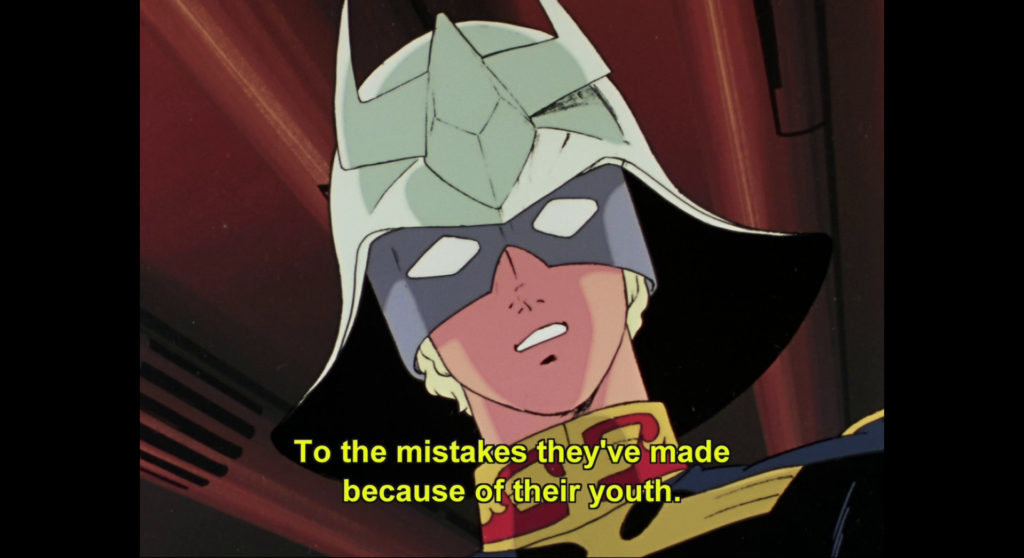
Have you ever talked with your co-stars about your role and lines?
I didn’t do anything like that. At the time of Gundam, there weren’t any voice actors that I was really close with, and I felt a sense of tension and alienation in a good way. If there were people close to me at the time, I’m sure they would say things like, “This Char is a pretentious guy, isn’t he?” or “Isn’t this a strange line?” I might have had a different view or impression of Char. I think it was actually a good thing that I was left alone for a while after recording started.
I heard about this later, but it seems that Tōru-chan also put all his energy into playing Amuro in order to break away from the image of Hyuma Hoshi in Star of the Giants when he was in Gundam. Furukawa-san (Toshio Furukawa, voice of Kai Shiden) was still a newcomer, and everyone was busy with their own affairs. I don’t think any of us were paying attention to other people because we were so focused on acting.
Did Char represent Director Tomino’s feelings?
When you played Char of each era, were there any parts that you consciously performed differently?
As I mentioned earlier, for me, the past Gundam works in which I played Char and Quattro are not a continuous “line” but rather individual “points”. Once a work was completed, I would start over again with a fresh mindset when taking on a new work, so I never thought, “It’s been a few years since then, so let’s try it this way this time.”
This is my own idea, and I have never talked about it with Director Tomino, but I have always felt that the man Char Aznable may be the director himself, and that Char’s story, in other words, is about how he has changed as well.
I may be misinterpreting, but I think that Quattro’s line in Zeta, for example, “That’s what it is to be young…”, was an expression of Tomino-san’s feelings toward the young cast members of the time. I interpreted the line in Char’s Counterattack, “I feel like a complete clown.” as a monologue of “You still want me to make Gundam?!”
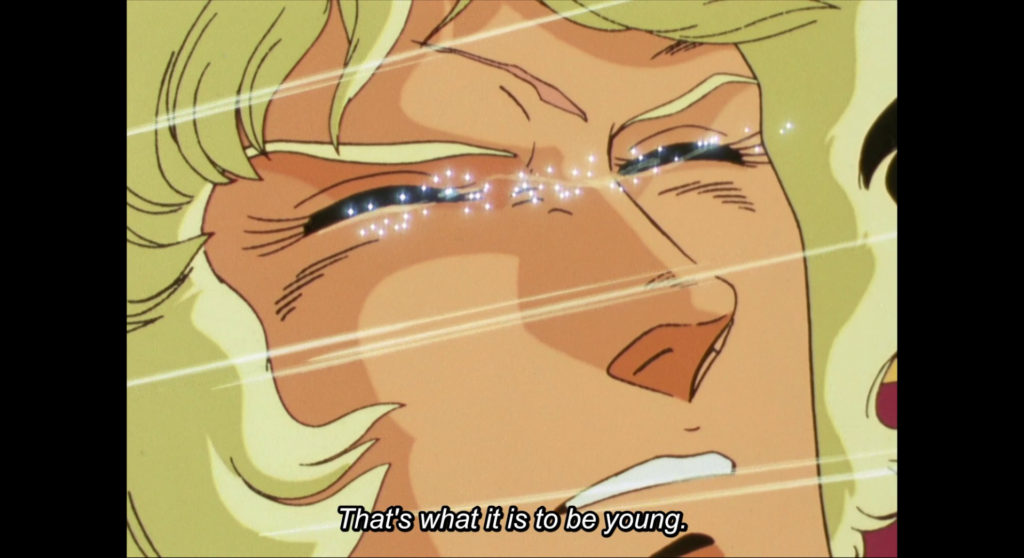
During Zeta, there were a lot of young cast members, so I was saying to Suzuoki-chan, “We have to do our best.” Such feelings may have appeared in the leadership of Quattro, who leads the younger generation such as Kamille.
Ikeda-san, in which work do you like Char the most?
It’s hard to choose which one is the best. Char of any era should be able to hold his own. Just like Char and Quattro from earlier, there is a sense of distance that I don’t quite understand, and it depends on the creator, doesn’t it? The Char depicted by Tomino-san is different from the Casval depicted by Yasuhiko-san in ORIGIN.
The other day, when I was watching NHK’s ORIGIN (Mobile Suit Gundam THE ORIGIN Advent of the Red Comet), I realized something. “Ah, I see. Did Yasuhiko-san want it this way?” and “Is this what you wanted me to do here?”
There may be slight differences in nuances, or the way he speaks or pauses, but I wonder if I wasn’t able to fully grasp Yasuhiko-san’s thoughts. For example, the scene where Char talks to Lalah standing on the wharf for the first time. It’s too late now, but there were many times when I thought, “Could I have done it this way instead?”
It seems as if you were not putting emotion into it on purpose.
It depends on the role, but especially in the case of Char, Yasuhiko-san’s drawings tell us a lot, so I try not to put my own emotions into it. The characters are already acting for us, so it is better not to do too much or too little.
Pictures have power, so I feel that it would be uninteresting to add my own emotions to them. That said, it takes a lot of courage as an actor to do nothing. Putting it into words sounds easy, but doing so in a performance is quite difficult.
Standing in front of the mic makes me want to do it (laughs). But really, Yasuhiko-san’s drawings are that powerful and compelling. Working on ORIGIN made me feel that again.
I’m really glad I did Zeta: A New Translation.
Did you ever find it difficult to perform certain scenes or lines?
I don’t think the lines themselves or performing them was so difficult. Such as Quattro’s line “The cactus flowers are blooming” (laughs). I didn’t really know what to convey with this line, but I didn’t think about it too hard and acted naturally. I’m relatively comfortable with that sort of thing, and I don’t get hung up on it too much or complicate matters.
It may not be a good thing to not be particular about it, but in the end, we voice actors have no choice but to ‘believe in the director.’ In my heart, I thought, “There are a lot of strange lines,” but I left it alone, saying, “The director is just doing his job too.” In that sense, at that time, I guess I was getting the job done.
How did you feel when Zeta was remade as a movie version?
I am still very glad that I did Zeta: A New Translation. When I first heard about it, I thought, “Why are we doing this now?” (laughs).
Maybe because I was doing it as a job at the time of Zeta, but when I received the offer for Zeta: A New Translation, I had completely forgotten about the story. So when I heard that the production was decided, I asked the producer if I could watch the TV series again.
But when I heard a message from Director Tomino saying, “I’m not particular about the TV series, so you don’t have to watch it,” I realized, “Oh, we’re making something new,” and that changed my mind.
At what point did you feel that it was good to do it again?
Char and Amuro meet again in the last scene of the first movie, The Heir to the Stars. The two murmur, “I’m sure of it, that’s Amuro Ray” and “I said Char, didn’t I?” as the cockpit of the Hyaku Shiki opens and Amuro’s hair is blowing in the wind… The “wind” in that scene was very impressive.
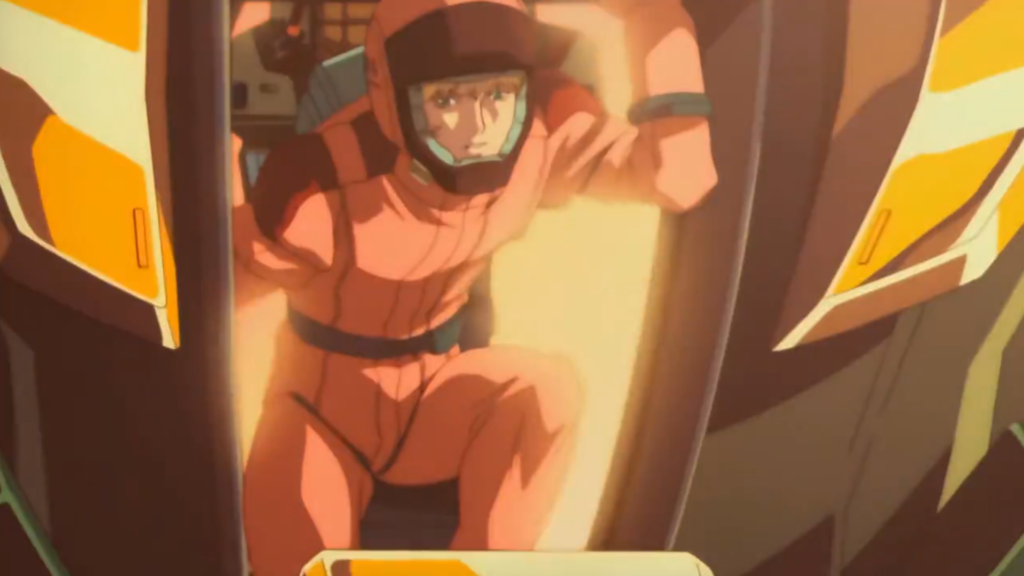
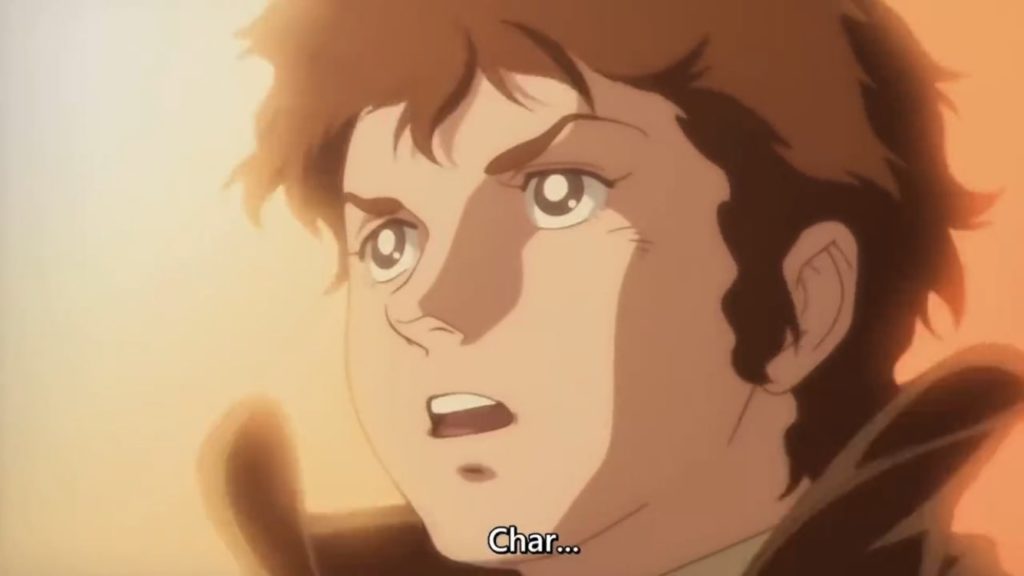
Is this what it feels like for 20 years to have passed since the TV series? I felt as if Director Tomino was saying to me, “What were the last 20 years to you? Feel it with this wind.”
Then, Gackt-chan’s (Gackt, in charge of the ending song “Hoshi wo Tsugu Mono”) song plays in the background and becomes the ending title… That production was cool as well. The moment I saw that scene, I thought from the bottom of my heart, “I’m glad I have this job.”
Until then, Gundam, which had been a “point” for me, began to appear as a single “line”.
Not only Director Tomino, but also Director Fukuda (Mitsuo Fukuda, director of Mobile Suit Gundam SEED DESTINY), Fukui-san (Harutoshi Fukui, author of the novel Mobile Suit Gundam UC), and Yasuhiko-san provided me various perspectives and experiences. I think that what I’ve learned has finally given me an objective bird’s-eye view of the work and world of Gundam.
They were thinking about changing the voice actors for ORIGIN?!
Did you read the original manga when it was decided that ORIGIN would be animated?
I read it, but not all of it. I read it once when it was serialized in Gundam Ace magazine and honestly thought “What is this? This story has been told”. I was wondering, “Yasuhiko-san, what’s going on?” Some time later, I met Yasuhiko-san at a party somewhere and he asked me, “Did you read it?” I told him, “No, I haven’t read it” (laughs). So he told me, “Well, it’s going to get interesting from now on, so read on,” and I started reading.
As I was reading, I realized that this wasn’t a remake, but Yasuhiko-san’s “Gundam”, and it suddenly became interesting. At that point, there was no talk of making an anime version, so I thought to myself, “It would be very difficult if they were to make an anime out of this,” as if I were talking about someone else’s problem (laughs).
It’s a story before Gundam, and Char from his boyhood also appears. It seemed like it would be difficult, and I wondered where I would be allowed to start if I were to play him. But on the other hand, I also felt that it would be okay if someone new did it. This is Yasuhiko-san’s Gundam, and it’s the One-Year War.
Would you have any resistance to someone other than yourself playing Char?
I don’t think so. Since it’s Yasuhiko-san’s “Gundam”, it’s natural for him to choose someone he thinks is good, and I wasn’t particular about that only being me. So when it was decided that Mayumi Tanaka would play Char when he was a child, and then me after that, I didn’t feel particularly relieved or anything like that, and just accepted it as normal, saying, “Okay, I’ll do it.”
However, I told them that the selection process should be in the form of an audition. If it’s no good, it’s better to have them say it’s no good and make it black and white. So, just in case, I did child Casval, and I also did the real Char and Edouard. I wonder if there’s a tape left of this somewhere? But at the time of the test, I acted thinking “This is not very good, so I guess I won’t be hired” (laughs).
The amazingness of Char, who says even the most outrageous lines without hesitation
Ikeda-san, please tell us about the Char that you have the most affection for.
I think it’s him from Gundam after all. That much is unwavering. His lines and character were really intense, and even now the impression remains. Because in the first episode, he suddenly comes out with the line, “No one likes to admit to them, to the mistakes they’ve made because of their youth.”
There are many others, so I’m at a loss as to which one to choose, but the line in the final episode, “Become a good woman, Amuro-kun is calling you,” left a strong impression on me. In the middle of such a life-or-death battlefield, I thought he was an unbelievable guy, telling his little sister, “Become a good woman.” But Char is the only one who can say that in a cool and casual way.
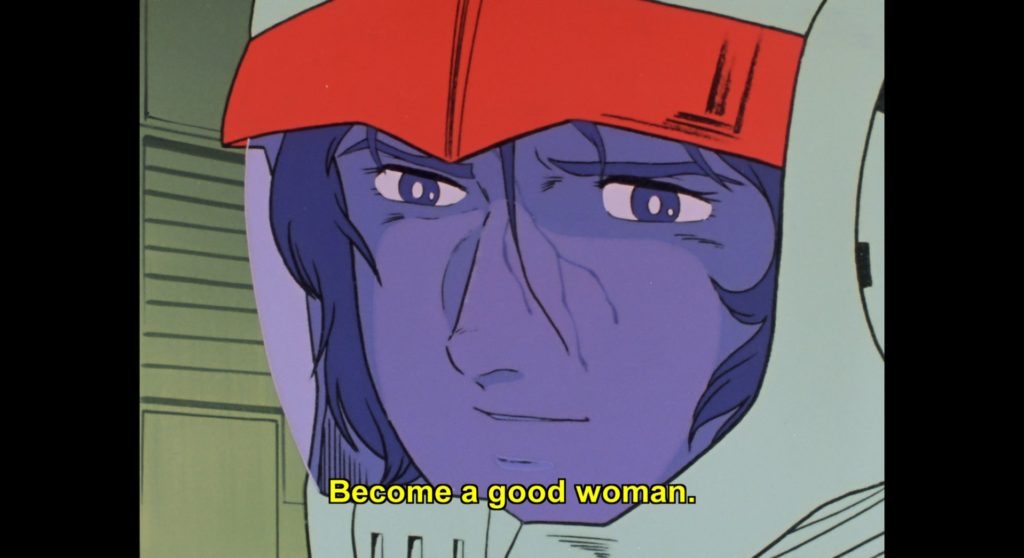
In the scene where he mutters, “Because he was a spoiled kid,” while watching Gihren’s speech on TV, ordinarily people would say, “who do you think you are?!” but strangely enough, it sounds very cool. This must be because the director is so good at what he does.
This line is short, but it has a great impact, so I use it when I’m asked to say a line at events and such (laughs).
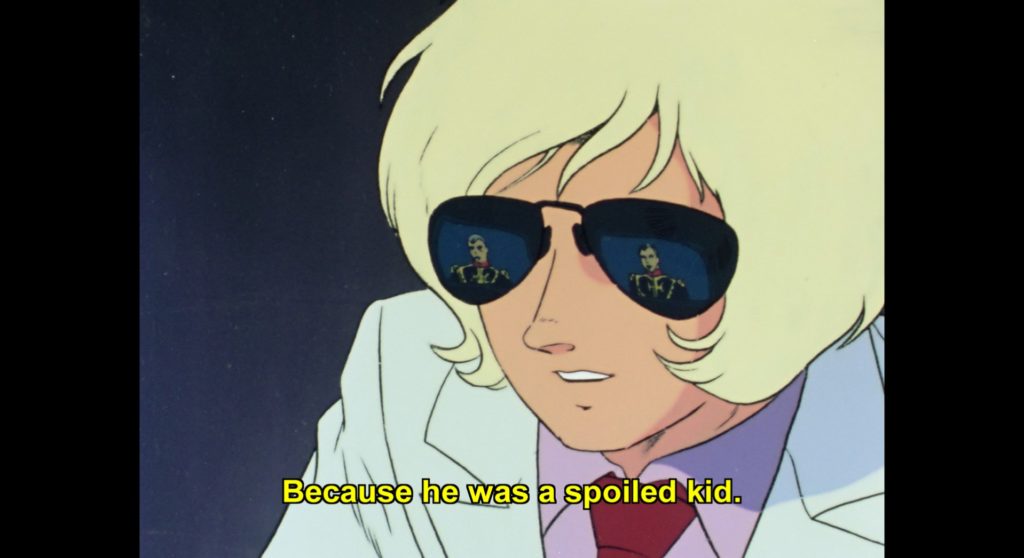
Is it possible that the length of the lines makes it difficult to express emotion?
I don’t think that’s particularly true. Basically, it’s a dialogue with the other party, and the director creates that kind of situation. Furthermore, if Yasuhiko-san’s drawings are there, it feels like the dialogue will naturally be filled with emotion.
For example, the line “I’m not joking around”. If you look only at the words, it doesn’t mean anything more than that, but at the same time, when you think of Yasuhiko-san’s drawing of Char’s face, you feel like the ending should be emphasized, “I’m not joking around!!” Even if there is no direction from the director or sound director, it naturally becomes such a line. It doesn’t matter how long the lines are.
I get a lot of inspiration from the situations and illustrations. I’m clumsy and unskilled, so I can’t play that many different roles, but the reason I’ve been able to do it this way is thanks to works and creators that have that much power.
What I’d say to Char is “thank you”
This summer, Hathaway’s Flash will finally be released in theaters. Please tell us your expectations for the new generation of Gundam works.
I’m looking forward to it, and I’m really excited about it too. I think it will be a work of great significance on the way towards the 50th anniversary.
The people who are making Gundam today, whether it’s Fukui-san or Sunrise’s Producer (Naohiro Ogata), are the generation that grew up watching Gundam as children, right? Some of them were not yet born when Gundam was broadcast, and these people are now creating a completely new Gundam.
I felt it when I was working on ORIGIN, but aren’t today’s visuals and technology really amazing? Bringing together the wisdom and talent of such a new era, it’s like a dream to see the work that Director Tomino created 30 years ago adapted.
On the other hand, Director Tomino is still on the front line kicking the butts of young people while continuing to create works. No, he really is an amazing person. I’m looking forward to Hathaway’s Flash, but I also look forward to the director’s future endeavors.
What kind of person is Char Aznable to you, Ikeda-san?
He’s a pretty good guy. I don’t know what he thinks of me (laughs). We’ve been on good terms recently. There was a time when I kept my distance from Char for a while. It’s like, “That’s enough, you,” or “Well, it goes without saying.” On the other hand, if there was a case where Char asked me, “Are you still going to do this?” I would reply, “It’s my job.”
I feel like we are friendly with each other these days. Is it because we’ve both grown older? I’ve never really thought about his age (laughs).
Finally, what would you say to your old acquaintance Char?
Thank you very much for being with me for such a long time.
I want to convey my gratitude to him from the bottom of my heart, and I think that he feels the same way. This may be my self-indulgence, but I think he’d say, “Thank you for giving me a voice until now.”
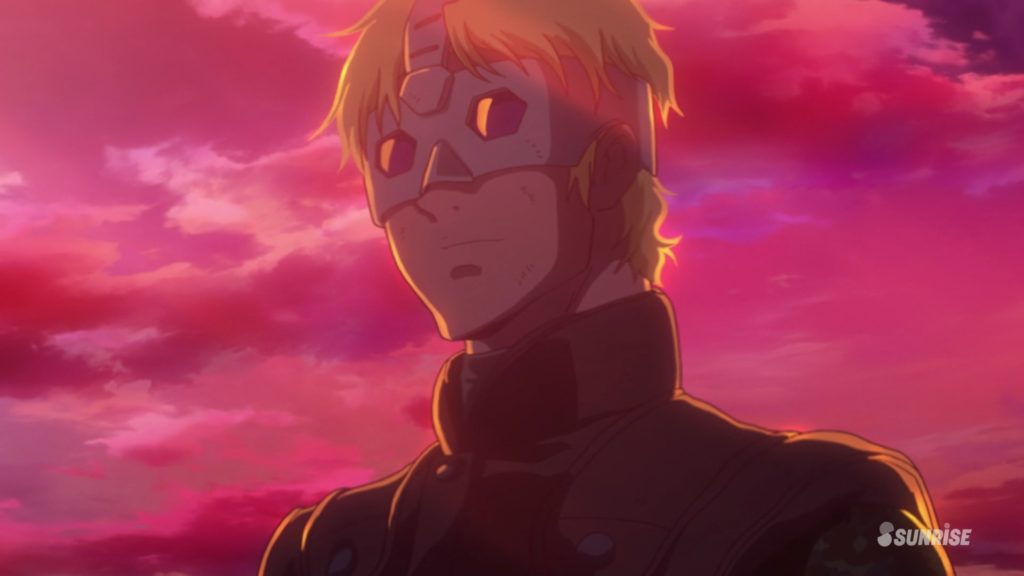
PROFILE
Shūichi Ikeda (池田秀一)
Debuted as a child actor in 1958. He played the leading role in the national drama Jiro Monogatari and became famous as a genius child actor. His first regular anime voice acting role was Char Aznable in Mobile Suit Gundam, followed by the role of Quattro Bajeena in Mobile Suit Z Gundam, and Char Aznable again in the movie Mobile Suit Gundam: Char’s Counterattack, enthusiastically performing the role and solidifying the character’s popularity. Recent representative works include Detective Conan as Shuichi Akai, Mobile Suit Gundam: THE ORIGIN as Char Aznable, Mobile Suit Gundam UC as Full Frontal, and ONE PIECE as Shanks. Belongs to the Tokyo Actor’s Consumer’s Cooperative Society.
